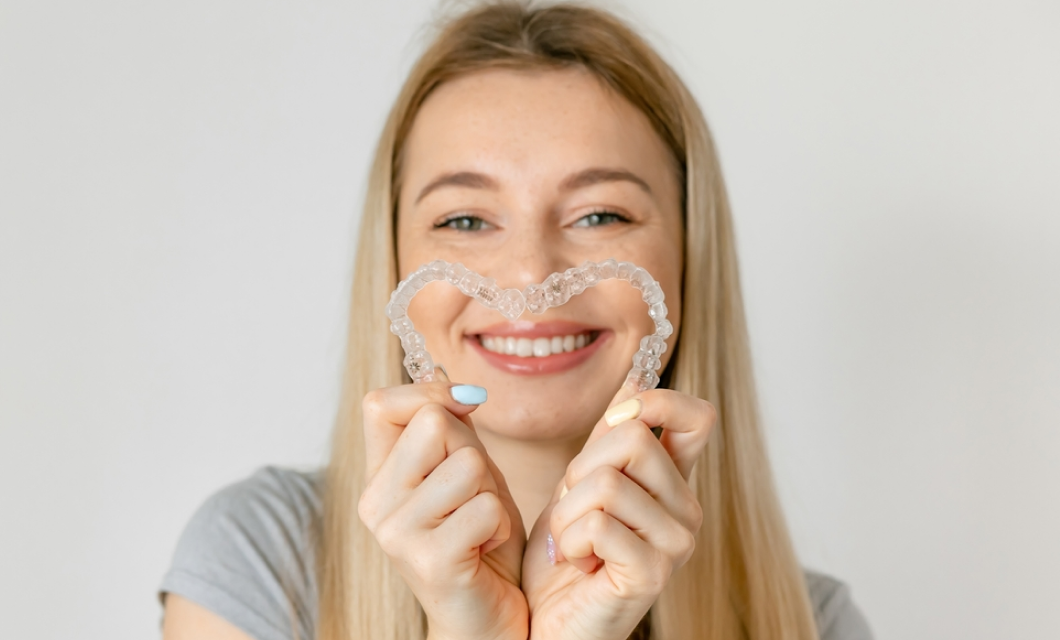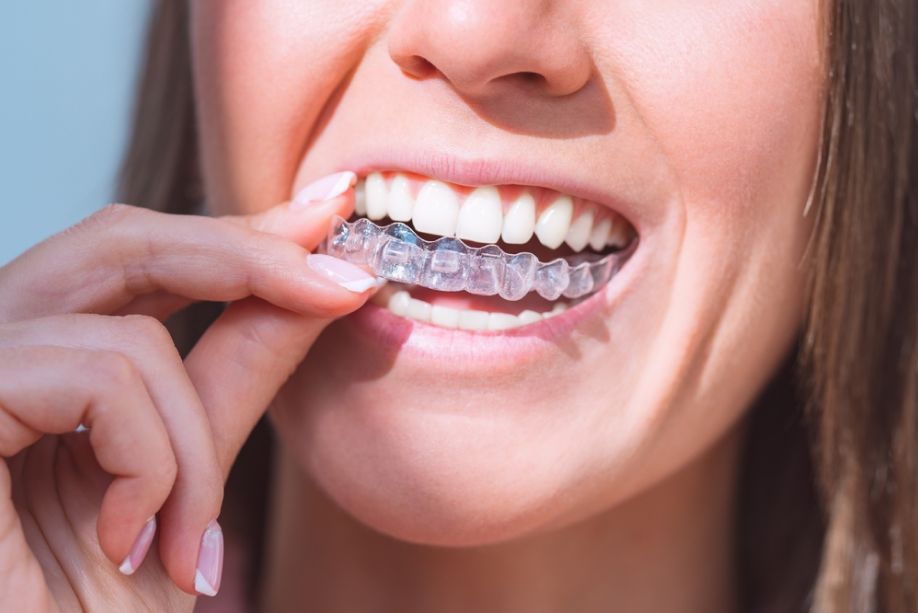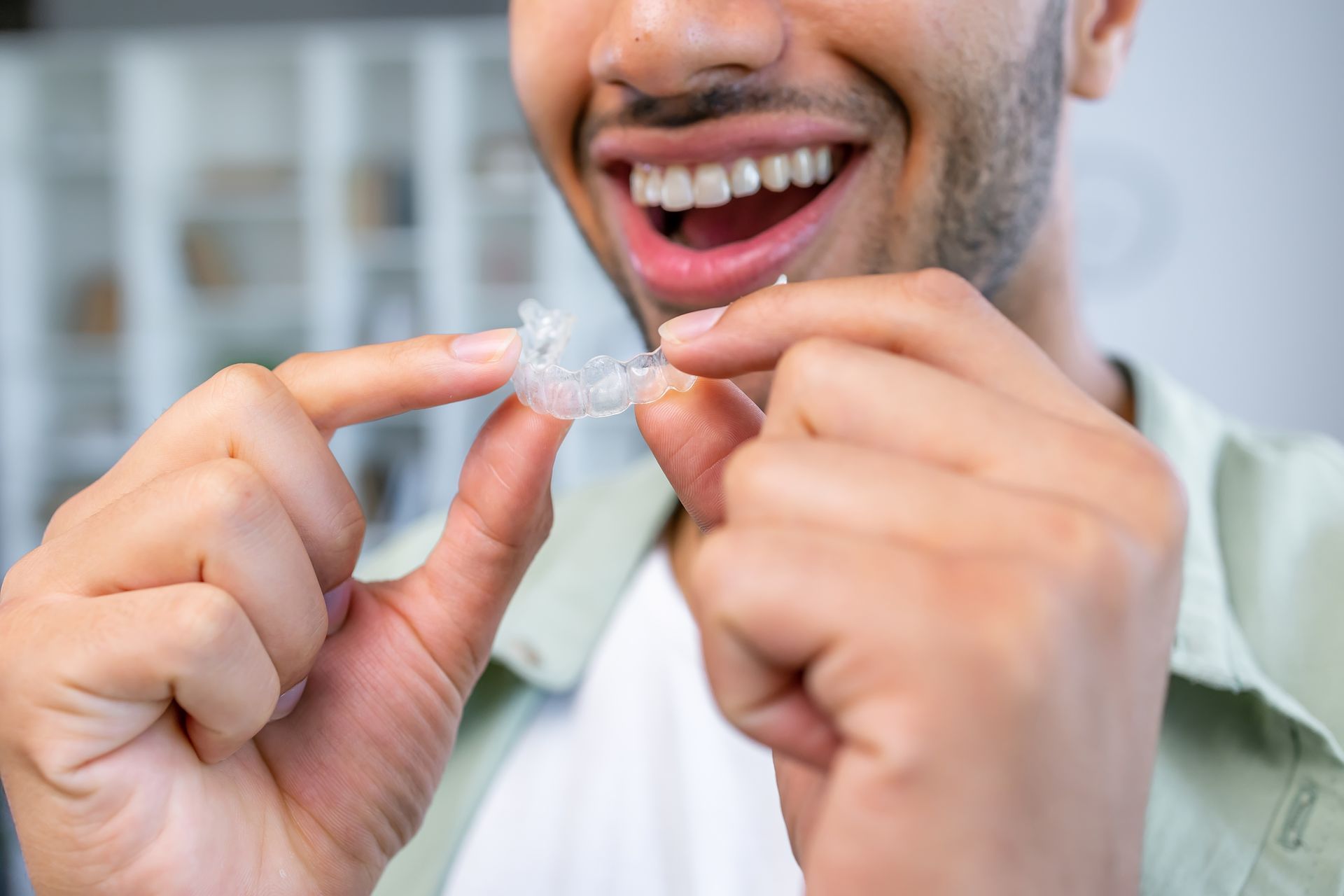Invisalign Dentist Rancho Bernardo
Enhancing Smiles Discreetly

The Benefits of Invisalign
A Comfortable and Discreet Path to Straight Teeth
Did you know that Invisalign has been chosen by over 16 million individuals to improve their smiles? More and more people are selecting clear aligners due to their comfort and ease of use.
Invisible Braces
Invisible braces like Invisalign have transformed the way we straighten teeth. These clear aligners are almost undetectable, making them a great choice for both adults and teens who prefer a more discreet option. They're custom-made to comfortably shift your teeth into place and are removable for easy eating and cleaning. It's a convenient, less visible solution that fits beautifully into any lifestyle, allowing you to smile confidently while improving your dental health.

Explore Our General Services
At Bernardo Hills Dentistry we are committed to providing family-focused preventive care and regular maintenance to ensure the oral health of our patients.
With a strong emphasis on proactive measures, we aim to prevent dental issues before they occur and maintain optimal oral well-being.
From routine check-ups and cleanings to personalized education on oral hygiene practices, our dedicated team is here to support the entire family in achieving long-term dental health.
Trust us to deliver compassionate, high-quality general services that prioritize preventive care and regular maintenance for a lifetime of healthy smiles.


Explore Our General Services
At Bernardo Hills Dentistry we are committed to providing family-focused preventive care and regular maintenance to ensure the oral health of our patients.
With a strong emphasis on proactive measures, we aim to prevent dental issues before they occur and maintain optimal oral well-being.
From routine check-ups and cleanings to personalized education on oral hygiene practices, our dedicated team is here to support the entire family in achieving long-term dental health.
Trust us to deliver compassionate, high-quality general services that prioritize preventive care and regular maintenance for a lifetime of healthy smiles.

A Comfortable Aligner Option
Invisalign's aligners are designed with comfort in mind, ensuring a smooth fit that contours precisely to your teeth. Unlike traditional braces, they're free from any metal brackets or wires that might cause irritation. This means you can wear them throughout the day without discomfort, making your journey to straighter teeth as pleasant as possible. Plus, their gentle yet effective alignment process ensures that each movement feels as natural as your smile.

Revitalize Your Smile with Dental Prophylaxis
Empowering Your Oral Health
Dental prophylaxis, also known as a professional dental cleaning, is a vital preventive procedure that plays a significant role in maintaining optimal oral health. During your dental appointment, the hygienist will provide a thorough cleaning, followed by a report on your home care routine.

Revitalize Your Smile with Dental Prophylaxis
Empowering Your Oral Health
Dental prophylaxis, also known as a professional dental cleaning, is a vital preventive procedure that plays a significant role in maintaining optimal oral health. During your dental appointment, the hygienist will provide a thorough cleaning, followed by a report on your home care routine.
Discover the Power of Prevention
Comprehensive Clinical Dental Examinations for Optimal Oral Health
Regular clinical dental examinations are crucial for maintaining optimal oral health and preventing potential dental issues. These examinations go beyond a simple check-up and encompass screenings for oral cancer, decay, bite evaluation, movement disorders, and breathing disorders.


Discover the Power of Prevention
Comprehensive Clinical Dental Examinations for Optimal Oral Health
Regular clinical dental examinations are crucial for maintaining optimal oral health and preventing potential dental issues. These examinations go beyond a simple check-up and encompass screenings for oral cancer, decay, bite evaluation, movement disorders, and breathing disorders.

Caring for Generations
Comprehensive Family Dental Care for Lifelong Smiles
Family dental care plays a vital role in maintaining optimal oral health for individuals of all ages. From children to teenagers, adults, and seniors, comprehensive dental care ensures healthy smiles for the entire family.

Caring for Generations
Comprehensive Family Dental Care for Lifelong Smiles
Family dental care plays a vital role in maintaining optimal oral health for individuals of all ages. From children to teenagers, adults, and seniors, comprehensive dental care ensures healthy smiles for the entire family.
Frequently Asked Questions
About Invisalign
-
How does Invisalign work?
Invisalign aligners are custom-made using 3D computer imaging technology to gradually move your teeth into the desired position. Each set of aligners is worn for about two weeks before moving on to the next set in the series.
-
How long does the treatment take?
The duration of Invisalign treatment varies depending on the individual's needs but typically ranges from 12 to 18 months, though some may see results in as little as six months.
-
How much does Invisalign cost?
The cost of Invisalign can vary based on the complexity of the case and the number of aligners needed. Generally, the cost is comparable to that of traditional braces and may be covered partially by dental insurance.
-
Is Invisalign painful?
Invisalign is generally less painful than traditional braces. The aligners are made of smooth plastic and are custom-fitted, which minimizes discomfort. However, some people may experience temporary discomfort or pressure for a few days at the beginning of each new stage of treatment.
-
Can I eat with Invisalign aligners on?
No, you should remove your aligners when eating or drinking anything other than water. This prevents food from getting trapped under the aligners, which could lead to cavities or stains.
-
How often must I wear my aligners?
Invisalign aligners should be worn for 20 to 22 hours a day for the best results. They should only be removed for eating, drinking, brushing, and flossing.
Frequently Asked Questions
About Family Dental Care
-
How early should I start cleaning my baby's teeth?
You can start cleaning your baby's teeth as soon as the first tooth appears. Use a soft, damp cloth or a toothbrush specifically designed for infants to gently clean the tooth and surrounding gums.
-
Are pacifiers and thumb sucking harmful to my child's dental health?
Prolonged pacifier use or thumb sucking can affect the alignment of the teeth and the development of the jaw. It is recommended to gradually wean your child off these habits by the age of 3 to prevent potential dental issues.
-
What should I do if my child chips or knocks out a tooth?
If your child chips a tooth, save any broken pieces and contact your dentist immediately for guidance. If a tooth is completely knocked out, rinse it gently with water and try to place it back in the socket. If that's not possible, keep it in a container of milk and seek immediate dental care.
-
Are silver fillings safe for children?
Silver fillings, also known as amalgam fillings, have been used for decades and are considered safe for children. However, tooth-colored composite fillings are a popular alternative as they blend with the natural tooth color.
-
How can I help my child develop good oral hygiene habits?
Lead by example and make oral hygiene a fun and regular part of your family's routine. Brush and floss together, provide age-appropriate toothbrushes and toothpaste, and encourage your child to take an active role in their oral care.
-
Is it normal for my child's teeth to be sensitive?
Some tooth sensitivity is normal, especially when exposed to cold or hot temperatures. However, if the sensitivity is severe or persistent, it's best to consult with your dentist to rule out any underlying dental issues.
-
What can I do to prevent tooth decay in my family?
Encourage good oral hygiene practices, limit sugary snacks and beverages, and ensure your family follows a balanced diet. Regular dental check-ups, professional cleanings, and fluoride treatments can also help prevent tooth decay.
-
Are there any natural remedies for toothache or gum pain?
While natural remedies may offer temporary relief, it's important to seek professional dental care to address the underlying cause of toothache or gum pain. Your dentist can provide appropriate treatment and advice.
-
How can I address bad breath in my child or family members?
Bad breath can be caused by poor oral hygiene, tooth decay, gum disease, or other underlying health issues. Encourage regular brushing, flossing, and tongue cleaning, and consult with your dentist if the problem persists.
-
What should I do in case of a dental emergency, such as a knocked-out tooth or severe toothache?
In a dental emergency, contact your dentist immediately. For a knocked-out tooth, keep it moist in milk or saliva and seek dental care within 1 hour. For severe toothache, rinse your mouth with warm water and use dental floss to remove any food debris. Contact your dentist for further guidance.
Frequently Asked Questions About Family Dental Care
-
How early should I start cleaning my baby's teeth?
You can start cleaning your baby's teeth as soon as the first tooth appears. Use a soft, damp cloth or a toothbrush specifically designed for infants to gently clean the tooth and surrounding gums.
-
Are pacifiers and thumb sucking harmful to my child's dental health?
Prolonged pacifier use or thumb sucking can affect the alignment of the teeth and the development of the jaw. It is recommended to gradually wean your child off these habits by the age of 3 to prevent potential dental issues.
-
What should I do if my child chips or knocks out a tooth?
If your child chips a tooth, save any broken pieces and contact your dentist immediately for guidance. If a tooth is completely knocked out, rinse it gently with water and try to place it back in the socket. If that's not possible, keep it in a container of milk and seek immediate dental care.
-
Are silver fillings safe for children?
Silver fillings, also known as amalgam fillings, have been used for decades and are considered safe for children. However, tooth-colored composite fillings are a popular alternative as they blend with the natural tooth color.
-
How can I help my child develop good oral hygiene habits?
Lead by example and make oral hygiene a fun and regular part of your family's routine. Brush and floss together, provide age-appropriate toothbrushes and toothpaste, and encourage your child to take an active role in their oral care.
-
Is it normal for my child's teeth to be sensitive?
Some tooth sensitivity is normal, especially when exposed to cold or hot temperatures. However, if the sensitivity is severe or persistent, it's best to consult with your dentist to rule out any underlying dental issues.
-
What can I do to prevent tooth decay in my family?
Encourage good oral hygiene practices, limit sugary snacks and beverages, and ensure your family follows a balanced diet. Regular dental check-ups, professional cleanings, and fluoride treatments can also help prevent tooth decay.
-
Are there any natural remedies for toothache or gum pain?
While natural remedies may offer temporary relief, it's important to seek professional dental care to address the underlying cause of toothache or gum pain. Your dentist can provide appropriate treatment and advice.
-
How can I address bad breath in my child or family members?
Bad breath can be caused by poor oral hygiene, tooth decay, gum disease, or other underlying health issues. Encourage regular brushing, flossing, and tongue cleaning, and consult with your dentist if the problem persists.
-
What should I do in case of a dental emergency, such as a knocked-out tooth or severe toothache?
In a dental emergency, contact your dentist immediately. For a knocked-out tooth, keep it moist in milk or saliva and seek dental care within 1 hour. For severe toothache, rinse your mouth with warm water and use dental floss to remove any food debris. Contact your dentist for further guidance.
Unveiling the Future of Dental Imaging
Transforming Smiles with Digital Scanning
Digital scanning has revolutionized dental imaging, offering a cutting-edge alternative to traditional x-rays. This advanced technology provides numerous benefits, including enhanced accuracy, reduced radiation exposure, and improved patient comfort.


Unveiling the Future of Dental Imaging
Transforming Smiles with Digital Scanning
Digital scanning has revolutionized dental imaging, offering a cutting-edge alternative to traditional x-rays. This advanced technology provides numerous benefits, including enhanced accuracy, reduced radiation exposure, and improved patient comfort.

Healthy Gums, Radiant Smiles
Unleashing the Power of Periodontal Care in Family Dentistry
Periodontal care plays a vital role in general dentistry, as it focuses on the health and maintenance of the gums and supporting structures of the teeth. Healthy gums are the foundation of a radiant smile and contribute to overall oral health.

Healthy Gums,
Radiant Smiles
Unleashing the Power of Periodontal Care in Family Dentistry
Periodontal care plays a vital role in general dentistry, as it focuses on the health and maintenance of the gums and supporting structures of the teeth. Healthy gums are the foundation of a radiant smile and contribute to overall oral health.
Hours & Address
Monday: 9:00 am - 6:00 pm
Tuesday: 9:00 am - 6:00 pm
Wednesday: 8:00 am - 5:00 pm
Thursday: 7:00 am - 5:00 pm
Friday: 7:00 am - 3:00 pm
Saturday-Sunday: Closed
Navigation Links
Hours & Address
Monday: 9:00 am - 6:00 pm
Tuesday: 9:00 am - 6:00 pm
Wednesday: 8:00 am - 5:00 pm
Thursday: 7:00 am - 5:00 pm
Friday: 7:00 am - 3:00 pm
Saturday-Sunday: Closed
Navigation Links
Hours & Address
Monday: 9:00 am - 6:00 pm
Tuesday: 9:00 am - 6:00 pm
Wednesday: 8:00 am - 5:00 pm
Thursday: 7:00 am - 5:00 pm
Friday: 7:00 am - 3:00 pm
Saturday-Sunday: Closed
Navigation Links
Bernardo Hills Dentistry | All Rights Reserved
